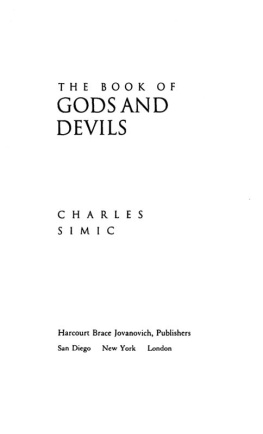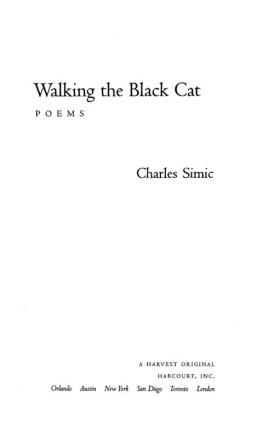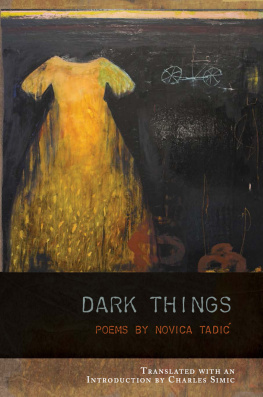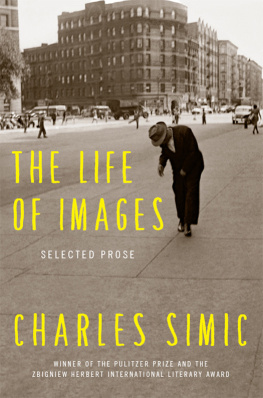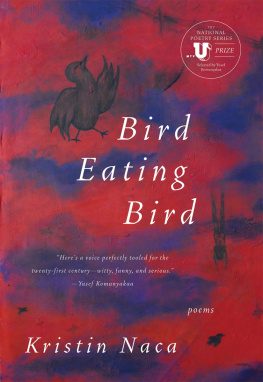Harcourt Brace Jovanovich, Publishers
San Diego New York London
Copyright 1990 by Charles Simic
All rights reserved. No part of this publication may be
reproduced or transmitted in any form or by any means, electronic
or mechanical, including photocopy, recording, or any information
storage and retrieval system, without permission in writing from
the publisher.
Requests for permission to make copies
of any part of the work should be mailed to:
Permissions Department, Harcourt Brace & Company,
6277 Sea Harbor Drive, Orlando, Florida 32887-6777.
Some of these poems first appeared, often in different versions,
in the following magazines, to whose editors a grateful
acknowledgment is made: Antaeus, Field, The Georgia
Review, The Gettysburg Review, Grand Street, The Ontario Review,
The Paris Review, Ploughshares, Poetry, The Poetry Miscellany,
The Southwest Review, Sulfur, The Western Humanities Review,
Witness.
Library of Congress Cataloging-in-Publication Data
Simic, Charles, 1938
The book of Gods and devils : poems/Charles Simic.1st ed.
p. cm.
ISBN 978-0-15-613546-7ISBN 0-15-613546-9 (pbk.)
I. Title.
PS3569.14725B6 1990
811'.54dc20 90-4297
Designed by Trina Stahl
Printed in the United States of America
First Harvest edition 1990
B C D E F
FOR HELEN
Contents
PART ONE
The Little Pins of Memory
St. Thomas Aquinas
A Letter
Factory
Shelley
The Devils
Crepuscule with Nellie
The Big Machine
Two Dogs
Le Beau Monde
Evening Talk
The Bethrothal
Frightening Toys
The North
PART TWO
Marching Music
A Bit of Mummery
The Big War
Bread
Death, the Philosopher
First Thing in the Morning
The White Room
Beyond Appearances
The Meaning
Celestial Overseers
Winter Sunset
A Word
Mrs. Digby's Picture Album
The Pieces of the Clock Lie Scattered
The Pronoun
Heights of Folly
The Immortal
PART THREE
At the Corner
With Eyes Veiled
Childhood Story
The World
Weather of the Soul
Whose Eyes to Catch, Whose Eyes to Avoid
The Gods
Cabbage
The Initiate
Paradise
Babylon
In the Library
The Window
The Wail
The Book of Magic
The Scarecrow
Windy Evening
Fourteenth Street Poem
PART ONE
THE LITTLE PINS OF MEMORY
There was a child's Sunday suit
Pinned to a tailor's dummy
In a dusty store window.
The store looked closed for years.
I lost my way there once
In a Sunday kind of quiet,
Sunday kind of afternoon light
On a street of red-brick tenements.
How do you like that?
I said to no one.
How do you like that?
I said it again today upon waking.
That street went on forever
And all along I could feel the pins
In my back, prickling
The dark and heavy cloth.
ST. THOMAS AQUINAS
I left parts of myself everywhere
The way absent-minded people leave
Gloves and umbrellas
Whose colors are sad from dispensing so much bad luck.
I was on a park bench asleep.
It was like the Art of Ancient Egypt.
I didn't wish to bestir myself.
I made my long shadow take the evening train.
"We give death to a child when we give it a doll,"
Said the woman who had read Djuna Barnes.
We whispered all night. She had traveled to darkest Africa.
She had many stories to tell about the jungle.
I was already in New York looking for work.
It was raining as in the days of Noah.
I stood in many doorways of that great city.
Once I asked a man in a tuxedo for a cigarette.
He gave me a frightened look and stepped out
into the rain.
Since "man naturally desires happiness,"
According to St. Thomas Aquinas,
Who gave irrefutable proof of God's existence and purpose,
I loaded trucks in the Garment Center.
Me and a black man stole a woman's red dress.
It was of silk; it shimmered.
Upon a gloomy night with all our loving ardors on fire,
We carried it down the long empty avenue,
Each holding one sleeve.
The heat was intolerable causing many terrifying human faces
To come out of hiding.
In the Public Library Reading Room
There was a single ceiling fan barely turning.
I had the travels of Herman Melville to serve me as a
pillow.
I was on a ghost ship with its sails fully raised.
I could see no land anywhere.
The sea and its monsters could not cool me.
I followed a saintly-looking nurse into a doctor's office.
We edged past people with eyes and ears bandaged.
"I am a medieval philosopher in exile,"
I explained to my landlady that night.
And, truly, I no longer looked like myself.
I wore glasses with a nasty spider crack over one eye.
I stayed in the movies all day long.
A woman on the screen walked through a bombed city
Again and again. She wore army boots.
Her legs were long and bare. It was cold wherever she was.
She had her back turned to me, but I was in love with her.
I expected to find wartime Europe at the exit.
It wasn't even snowing! Everyone I met
Wore a part of my destiny like a carnival mask.
"I'm Bartleby the Scrivener," I told the Italian waiter.
"Me, too," he replied.
And I could see nothing but overflowing ashtrays
The human-faced flies were busy examining.
A LETTER
Dear philosophers, I get sad when I think.
Is it the same with you?
Just as I'm about to sink my teeth into the noumenon,
Some old girlfriend comes to distract me.
"She's not even alive!" I yell to the skies.
The wintry light made me go that way.
I saw beds covered with identical gray blankets.
I saw grim-looking men holding a naked woman
While they hosed her with cold water.
Was that to calm her nerves, or was it punishment?
I went to visit my friend Bob who said to me:
"We reach the real by overcoming the seduction of images."
I was overjoyed, until I realized
Such abstinence will never be possible for me.
I caught myself looking out the window.
Bob's father was taking their dog for a walk.
He moved with pain; the dog waited for him.
There was no one else in the park,
Only bare trees with an infinity of tragic shapes
To make thinking difficult.
FACTORY
The machines were gone, and so were those who worked them.
A single high-backed chair stood like a throne
In all that empty space.
I was on the floor making myself comfortable
For a long night of little sleep and much thinking.
An empty bird cage hung from a steam pipe.
In it I kept an apple and a small paring knife.
I placed newspapers all around me on the floor
So I could jump at the slightest rustle.
It was like the scratching of a pen,
The silence of the night writing in its diary.
Of rats who came to pay me a visit
I had the highest opinion.
They'd stand on two feet
As if about to make a polite request
On a matter of great importance.
Many other strange things came to pass.
Once a naked woman climbed on the chair
To reach the apple in the cage.
I was on the floor watching her go on tiptoe,
Her hand fluttering in the cage like a bird.
On other days, the sun peeked through dusty windowpanes
To see what time it was. But there was no clock,
Only the knife in the cage, glinting like a mirror,
And the chair in the far corner
Where someone once sat facing the brick wall.
SHELLEY
for M. Follain
Poet of the dead leaves driven like ghosts,
Driven like pestilence-stricken multitudes,
I read you first
Next page
